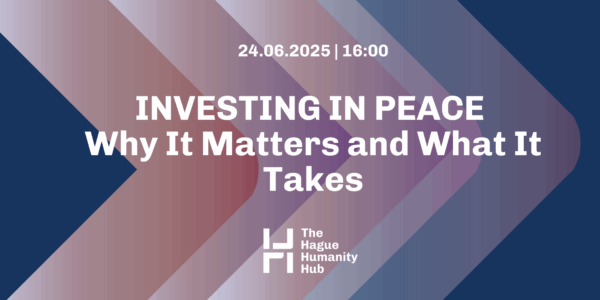That was the central question at the heart of an exploratory online dialogue hosted by The Hague Humanity Hub on 24 June 2025. Convening participants from civil society, philanthropy, and private finance, the session marked the beginning of a collaborative journey to reimagine how we fund and foster peaceful societies. It came at a critical moment amid global conflict escalation, rising militarization, and the convening of world leaders for the NATO Summit in The Hague.
This session was not designed as a policy pitch or expert panel. Instead, it created space for collective reflection.
Rethinking Peace as a Systemic Investment
One of the session’s starting points was a reframing: peace is not simply the absence of violence. A truly “just peace” demands the presence of justice, dignity, and equity. And yet, despite the enormous societal value of peace – estimated at a 12% annual drag on global GDP when absent – funding for peacebuilding is at a 15-year low. There is a stark mismatch between rising needs and declining investment.
Speakers Hilde Deman (Search for Common Ground), Chris Worman (GivingTuesday), and Hanah Chang (ESG investment professional) provided powerful examples of how peace can – and must – be integrated across sectors. From long-term, trust-based funding in civil society to ESG-aligned investment in fragile regions, they made the case for embedding peace into both institutional logic and financial practice.
One case study shared by Chang, the CADMUS Peace Fund, underscored how strategic collaboration between investors and peace-focused foundations can pioneer new standards. Initially framed as a niche equity fund, it is now engaging with over 80% of its portfolio companies on peace-related practices (SDG16). This model of “investment stewardship” offers a potential blueprint for shifting financial flows toward conflict-sensitive, peace-promoting initiatives.
From Business Case to Civic Mandate
However, participants also grappled with deep tensions. Should peace be framed as a business case – or is framing itself a barrier? While quantifying return on investment can unlock new funding channels, many expressed discomforts in reducing peace to a line item in a portfolio. Peace, they argued, is fundamentally about values, systems, and relationships – and not just metrics.
This tension points to a larger cultural challenge: peacebuilding is undervalued in dominant professional and political narratives. Military solutions continue to receive disproportionate attention and funding, while peace remains abstract, under-resourced, and often de-politicized.
As one participant put it:
“We are investing in weapons to protect our values. But who is investing in the values themselves?”
Investing in Peace and Changing the System
The session also sparked broader reflection: how can we fund peace within today’s systems – and how can we begin to change those systems to make peace more possible? Ideas under consideration include:
- A Peace Investment Guide for funders and investors
- A Investing in Peace Lab to prototype funding mechanisms, narratives, and partnership models
- “Peace scans” to map current (non-)investment patterns in peace
- Strategic advocacy to shift narratives in finance, policy, and culture
This session was the first step toward building a community that has the ambition to link activism, investment, culture, and systemic thinking – rooted in The Hague but globally connected.
What Comes Next
The Humanity Hub and its partners are now working to convene a follow-up session in fall 2025, likely in person, to take the next steps: co-developing a concept note for the Investing in Peace Lab, identifying further partners, and shaping the roadmap ahead.
As one speaker put it:
“Clarifying the narrative is part of the work. If we wait for it to be perfect, we will never begin.”
Are You Ready to Invest in a Just Peace?
Peace is not just the result of politics. It’s a reflection of how we allocate our resources, design our systems, and define what matters. If you believe in rebalancing these priorities, we invite you to take the next steps.
Reach out to engage@humanityhub.net to express your interest or to share collaboration opportunities.
